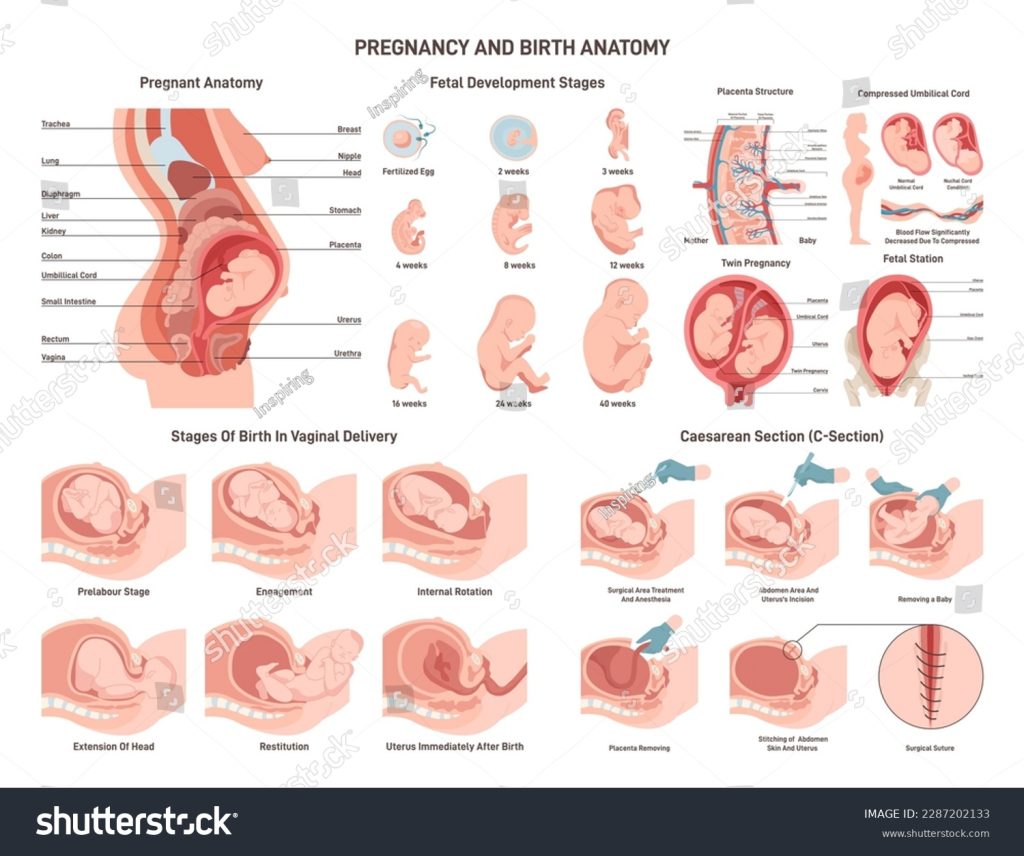Childbirth: A Journey Through Evolution, Faith, and Science
The Biological Perspective: A Unique Human Challenge
From a purely biological standpoint, human childbirth is more complex and dangerous than that of most animals. This complexity arises primarily from two factors: bipedalism and brain size.
The Evolutionary Trade-Off
Around 4 million years ago, humans evolved to walk upright on two legs. This adaptation narrowed the pelvis, which, while beneficial for locomotion, created a tighter birth canal. Simultaneously, as humans developed larger brains to support advanced cognitive abilities, the size of infants’ heads increased. This evolutionary trade-off resulted in what scientists term the “obstetrical dilemma,” making human childbirth uniquely difficult.
Altricial Births
Unlike most animals that give birth to relatively independent offspring, human babies are born in a highly helpless state. This is because, to fit through the birth canal, human infants must be born earlier in their development compared to other species. As a result, human mothers experience a longer dependency period post-birth, which also adds to the complexity of the process.
The Role of Culture and Medicine
Advances in Medicine
Modern obstetrics has revolutionized childbirth. Techniques like cesarean sections, epidurals, and prenatal care have significantly reduced maternal and infant mortality rates. However, these advancements highlight how inherently challenging childbirth remains for humans, despite evolutionary adaptations.
Cultural Practices
Across cultures, childbirth rituals and practices vary, often reflecting societal values and beliefs. In many societies, the pain and endurance associated with childbirth are seen as a rite of passage, symbolizing strength and sacrifice.
The Spiritual Dimension: A Biblical Perspective
The Bible offers a spiritual explanation for the pain of childbirth. In Genesis 3:16, God tells Eve, “I will greatly increase your pains in childbearing; with painful labor, you will give birth to children.” This verse is often interpreted as a consequence of the original sin, making the act of childbirth not just a biological event but a spiritual ordeal laden with meaning.
This biblical narrative has shaped the cultural and emotional perception of childbirth in many parts of the world. For believers, the pain of childbirth is not merely a physical experience but a reminder of humanity’s shared history and a pathway to redemption through the miracle of life.
The Psychological Aspect
The pain of childbirth is not merely a physical phenomenon; it is also deeply psychological. Fear and anxiety can amplify the perception of pain, while support, preparation, and the right environment can ease it. The rise of practices like hypnobirthing and the emphasis on mental preparation for childbirth highlight how intertwined the mind and body are in this process.
Reconciling Science and Faith
So, what can we conclude about the complexities of human childbirth? From a scientific perspective, the challenges arise from evolutionary adaptations that favor intelligence and mobility over ease of childbirth. From a spiritual standpoint, these challenges reflect humanity’s journey through sin and redemption.
The pain and difficulty of childbirth, however, are not simply burdens. They also symbolize resilience, the capacity for sacrifice, and the enduring strength of mothers. Whether seen through the lens of faith or biology, childbirth remains a profound testament to the intricacies of human existence.

Moving Forward
Understanding the complexities of childbirth allows us to appreciate the blend of evolution, culture, and spirituality that shapes our lives. It also underscores the importance of supporting maternal health, improving access to medical care, and acknowledging the profound emotional and spiritual dimensions of bringing life into the world.
The fact that bringing a child into the world is one thing, but setting that child up to be useful to the planet is another, cannot be overstated. Parenting is not just about nurturing a child but about preparing them to be responsible, compassionate, and resourceful members of society.
Tips for Good Parenting
- Instill Values Early: Teach children respect, honesty, empathy, and responsibility from a young age.
- Foster Independence: Encourage problem-solving and decision-making to help children build confidence and resilience.
- Lead by Example: Model the behavior you wish to see in your child. Actions often speak louder than words.
- Prioritize Education: Provide access to quality education and create an environment that encourages curiosity and lifelong learning.
- Encourage Emotional Intelligence: Teach children how to manage emotions and understand others’ feelings, fostering healthy relationships.
- Promote a Sense of Purpose: Help children discover their interests and guide them toward meaningful goals that contribute to society.
- Create a Safe and Loving Environment: Ensure they feel supported and loved, giving them the foundation to thrive.
Ultimately, childbirth is not merely a challenge to be overcome but a miracle to be celebrated—a powerful reminder of what it means to be human, and an opportunity to shape a future that benefits both the individual and the world at large.

